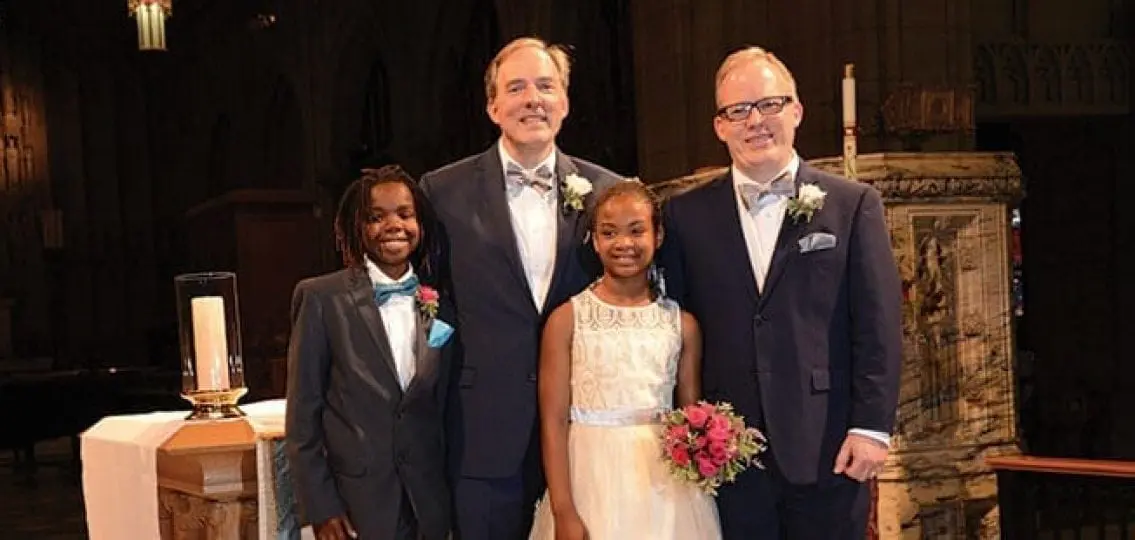Adoption Parenting
This evening we set the table for eight people rather than the usual four. This happens nearly every weekend at our house when our kids’ friends come over to eat with us. I love hearing their banter and seeing faces in a variety of hues gathered around our kitchen table.
Meal times like this one make me feel like any other family, though we do not look like many other families. My husband and I are two middle-aged white guys; our son (13) and our daughter (9) are African American. Both kids came to our family as infants, and it has always been obvious that our family was formed by adoption.
As parents of a teenager and a tweener, we deal with the typical issues of adolescence like any other parents. Layered in with those typical teen issues, however, are additional ones related to race and adoption.
Like most teens, our son would more likely choose to spend time with friends than with us. Our daughter is headed in that direction as well. Our son is beginning to think about dating and what he wants his life to be like after he grows up. Like most parents, we struggle to make sure the kids get their homework done and argue about whether they need to be in front of a screen every waking moment.
When Gay Parents Adopt: Issues We’ve Faced Together
Racial Identity
Our son was conscious of race by the time he was three years old. That’s when he began to comment on people’s skin tones. While our discussions about race might have started with skin color, they have grown more complex, exploring ways that race intersects with other issues, such as class. After the death of Trayvon Martin, we started having conversations with our son about what he needs to do to keep himself safe. The death of Tamir Rice, who was nearly the same age as our son and who was killed less than two miles from our house, hit even closer to home.
Raising an African-American boy or girl in this age can feel daunting. It can be especially challenging because we don’t share the same racial background as our children. In fairness, I know that African-American friends of ours whose adoptive children share their race struggle with it, too. We look for opportunities to nurture friendships with other African-American families and seek their advice. We feel fortunate that our children have had African-American teachers, physicians, and pastors who can serve as role models.
Adoption Issues
We chose the community we live in partly because of its diversity. We hoped our kids would see that there are many kinds of families and not feel ostracized. Still, even though there are a number of interracial families in our community, transracial or same-sex parents have formed far fewer.
To make sure our kids did not feel alone, I helped form a Transracial Adoptive Family Group through Adoption Network Cleveland, an organization that supports anyone touched by adoption. We meet monthly in people’s homes or for activities. The kids play, the parents talk, and everyone eats. It helps both kids and adults feel less isolated. In addition, every summer our family goes to an LGBT Family Week in Provincetown, Massachusetts. Many of the families there were formed by adoption, and some are transracial. Surrounded by other families like ours, we feel a special sense of belonging.
Making a Connection
As adoptees, our children naturally long for connection with their birth families. Our daughter’s adoption has been open from the beginning, and we see her mother and sisters quarterly. Shortly after our son started school, he said that it wasn’t fair that his sister got to visit with her birth mother and that he didn’t get to see his. That led us to make a connection with his birth family—something we had not had previously. Organizing visits with both kids’ birth families requires a lot of work. But we are willing to put in the effort because we know how important the visits are to our kids’ sense of well-being.
We could not imagine what adoption parenthood would require when our children first arrived. Though it is the most challenging thing we have ever done, it is also rewarding. Watching our son and daughter form friendships and enjoy normal activities like having friends over for dinner gives us confidence that they both will be able to successfully navigate through adolescence—as well as through the complex issues of race and adoption.
Adoption Network Cleveland was founded in 1988 and provides support, education, and advocacy for adoptees, birthparents, adoptive parents, prospective adoptive parents, foster youth and parents, foster care alumni, and professionals. ANC offers a wide variety of workshops, support groups, and social gatherings for anyone touched by adoption and foster care. To learn more, visit AdoptionNetwork.org.




